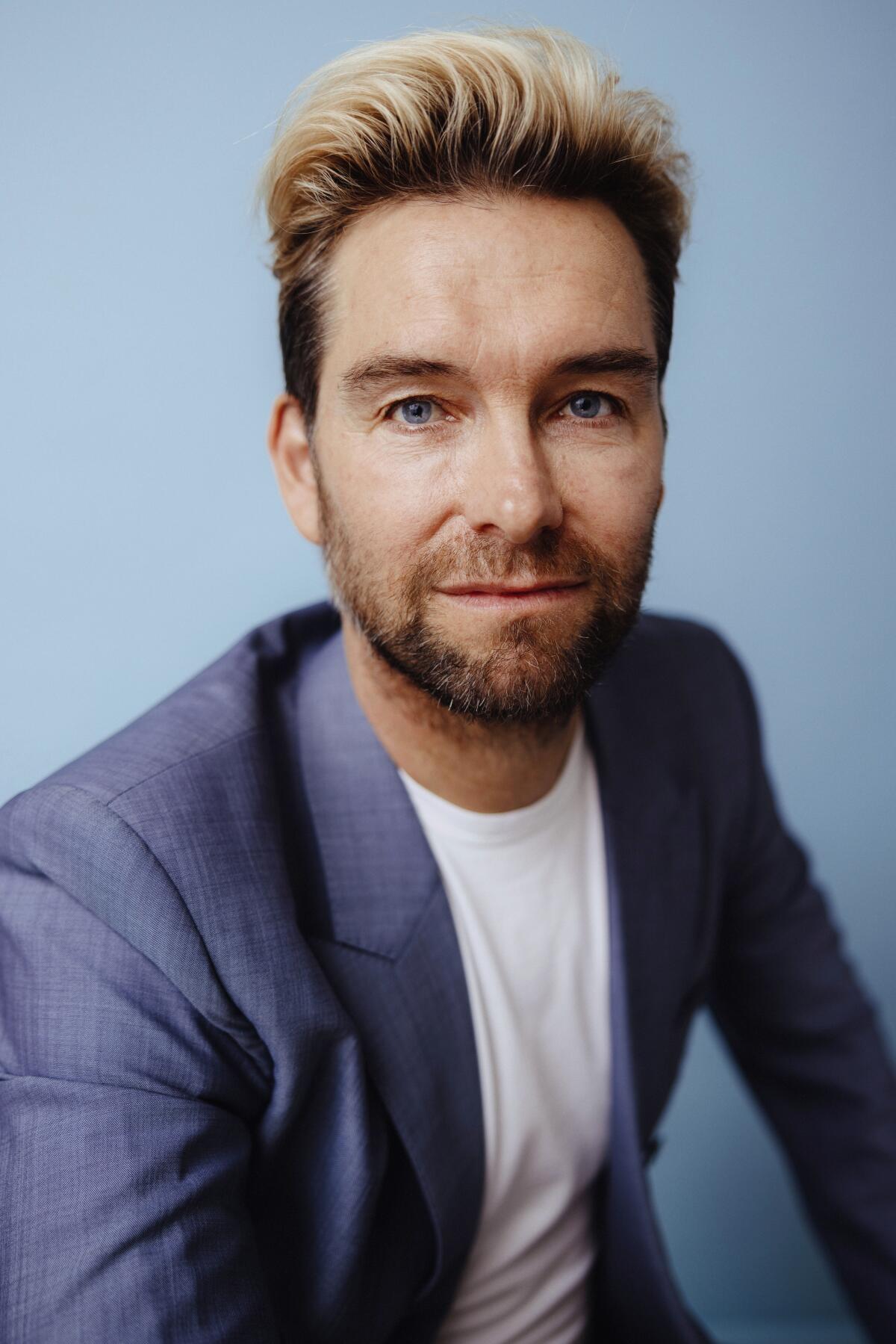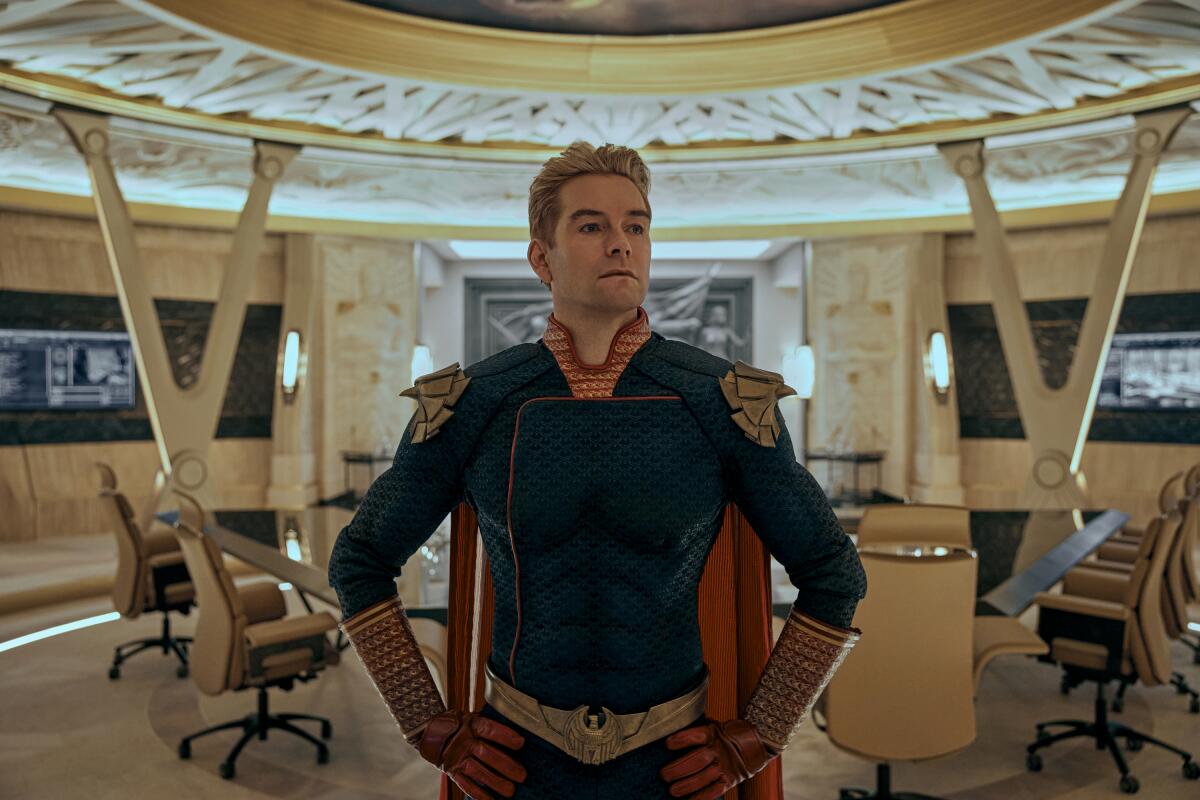Sitting down with Antony Starr, who plays perhaps the most intriguing villain on current television as Homelander on Prime Video’s “The Boys,” is disconcerting. Homelander is an Aryan super-sociopath, a gleaming Mr. America with a license to kill. Starr, human-sized and chummy, sports fashionable chin scruff, one pair of glasses on his face and one hanging on his T-shirt collar; out of his photo-shoot couture and into some shorts, his accent is pure New Zealand. And most of all, he’s so … nice.
You’re waiting for the trap to spring.
He says, “What I didn’t realize was how much of myself I was putting into the role. Obviously, not in terms of flying and lasering …” When it’s pointed out that that’s exactly what somebody who secretly could do those things would say, he gives an actual mwah-ha-ha evil laugh. “But without going into specifics of me, in terms of the emotional stuff, the closer I can make things to myself, the more I can tap into something that’s real.”

In “The Boys,” a sprawling conglomerate with greedy fingers in pies from mainstream media to national defense creates and controls super-people. Homelander and his team are seen as heroes thanks to omnipresent PR, but what they’re really defending isn’t truth or justice so much as rising share price.
“There’s a very strange thing that’s happened with the character, though he is clearly not a good guy. A lot of people have glommed onto him. There’s a weird element out there that actually kind of idolize him. I’ve seen some s— on Twitter and I’m like, ‘Wait, What? You are missing the point entirely!’ ”
The concept of Homelander (or “Homie,” as Starr calls him), the most powerful being known to man, raises the question, “What if Superman were a narcissistic sociopath?”
Showrunner Eric Kripke “has said many times, ‘He’s Trump!’ — [but] if you made it too directly Trump, it becomes very two-dimensional,” Starr says. “I understand exactly what Eric means, and [Homelander murdering a protester before a crowd] was his ‘Fifth Avenue’ moment, 100%. But with the speechy stuff, if you want someone who can string a sentence together, who does that better than … Obama?”
Homelander is an Übermensch perpetually in uniform as general-emperor of his own army. He smiles, unleashing those impossibly pearly whites for the cameras, speaking in his hard American accent of Freedom! Justice! But he’s always one minor disappointment away from that face darkening and those baby blues lighting up with lethal lasers. And he has borderline-psychotic mommy and daddy issues.
His isolation is immaculate. It’s almost perfect.
— Antony Starr, on ‘Homelander’
“He’s the loneliest guy in the world. He’s got no one to relate to but himself,” Starr says, explaining that a disturbing scene in which Homelander looks in a mirror and sees a reflection of himself that proceeds to alternately comfort and berate him is a manifestation of an imaginary friend “Homie” concocted in his lonely youth as a lab subject. “His isolation is immaculate. It’s almost perfect. He’s not stupid; he’s incredibly emotionally stunted.”
The show is loaded with jaw-droppingly gonzo moments (Season 3 featured an episode called “Herogasm” and the title did not exaggerate), but that’s just the meth-laced icing on a socially and politically conscious cake. As Kripke has described it, “The Boys” is “dark satire about late-stage capitalism.” Starr wholeheartedly agrees.
“You can take it however you want. If you want to just watch something that’s thoroughly entertaining, a little crazy, and you’ve got a stomach for it,” says the actor, “you can do that. But there’s so many details that are put in there, so many Easter eggs, so many conversation-starting episodes and moments, I think it’s a bit of an all-play. One of the things about the show that I’m really proud of is that we do unapologetically provoke conversation.”
Homelander is hardly static. Although always ultra-powerful and dangerously detached, he starts the series as a still somewhat-controllable product. By Season 3, he’s shaken off his dampers. And after that public killing, he gets cheered.

“First of all, there’s that horrendous likening himself to MLK, which is just gobsmacking,” Starr says of Homelander addressing the crowd afterward. “But then he says,” and Starr suddenly transforms into Homelander, that hard American dialect oozing with murderous confidence, “ ‘I showed people the real me, and they love me for it.’ ”
But then the nice New Zealander returns: “That was emancipation, unshackling from this very restrained version of himself; in Season 4, we’ll be negotiating both of those elements. We’ve always tried to keep our horrible, warped, twisted little baby growing.”






